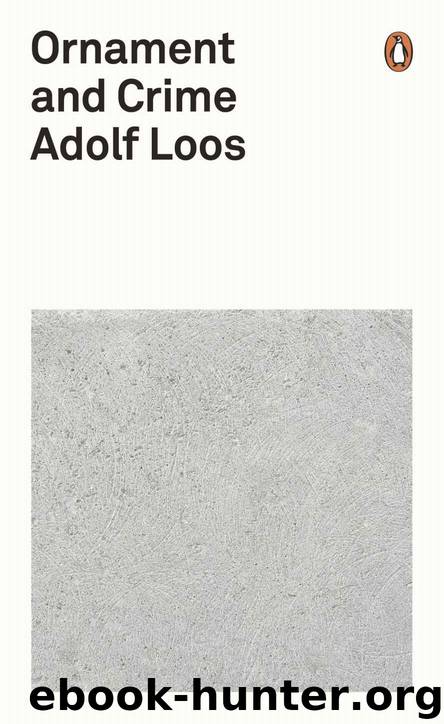Ornament and Crime by Adolf Loos

Author:Adolf Loos [Loos, Adolf]
Language: eng
Format: azw3, epub
ISBN: 9780141392981
Publisher: Penguin Books Ltd
Published: 2019-05-29T16:00:00+00:00
Ornament and Crime (1908)
In the womb, the human embryo passes through the entire phase of evolution corresponding to the evolution of the animal kingdom. And when the human being is born, his sensory impressions are like those of a new-born puppy. His childhood passes through all the transformations that correspond to the history of mankind. At the age of two he sees like a Papuan, at the age of four like a Teuton, at six like Socrates, at eight like Voltaire. At the age of eight he becomes aware of purple, the colour that the eighteenth century discovered. Because before then the violet was blue and the indigo snail-red. Even today, physicists are pointing to colours in the solar spectrum that already have a name, but which will be known only to the human beings of the future …
The child is amoral. For us, so is the Papuan. The Papuan slaughters his enemies and devours them. He is not a criminal. But if modern man slaughters and devours someone, he is a criminal or a degenerate. The Papuan tattoos his skin, his boat, his rudder, in short everything that lies to hand. There are prisons in which 80 per cent of the inmates have tattoos. The tattooed people who are not in jail are latent criminals or degenerate aristocrats.
The urge to ornament one’s face and everything that lies to hand are the primal origins of visual art. It is the babbling of painting. But all art is erotic.
The man of our own times, who follows his innermost urgings to smear the walls with erotic symbols, is a criminal or a degenerate. What is natural in the Papuan and the child is a manifestation of degeneracy in modern man. I have made the following discovery and given it to the world: the evolution of culture comes to the same thing as the removal of ornament from functional objects. I thought that by saying this I was bringing joy into the world, but the world has not thanked me. People were sad and hung their heads. What oppressed them was the realization that they would not be able to produce any new ornaments. What, those things that any Negro could do, which all peoples and ages before us have been able to do, we alone, the people of the nineteenth century, are not capable of doing them? Those things that mankind in earlier millennia made without ornament were heedlessly rejected and cast into oblivion. We have no workbenches from Carolingian times, but any trash revealing even the smallest ornament was collected and cleaned, and magnificent palaces were built to house it.
And we walked sadly from one display case to the next, ashamed of our impotence. Every age has had its style, and ours alone should be denied one?! And by style they meant ornament. And I replied: weep not. Behold, this is what constitutes the greatness of our age, that it is not capable of producing a new ornament. We have overcome ornament, we have fought our way through to ornamentlessness.
Download
This site does not store any files on its server. We only index and link to content provided by other sites. Please contact the content providers to delete copyright contents if any and email us, we'll remove relevant links or contents immediately.
| Decorative Arts | Design History & Criticism |
| Furniture Design | Industrial & Product Design |
| Interior & Home Design | Jewelry Design |
| Textile & Costume |
POP by Steven Heller(2884)
Japanese Design by Patricia J. Graham(2556)
The Power of Broke by Daymond John(2376)
Architecture 101 by Nicole Bridge(2350)
Fusion 360 for Makers by Lydia Sloan Cline(1987)
Indistractable: How to Control Your Attention and Choose Your Life by Nir Eyal(1936)
Origami Art by Michael G. Lafosse & Richard L. Alexander(1735)
Actionable Gamification: Beyond Points, Badges, and Leaderboards by Yu-kai Chou(1721)
Batik by Rudolf Smend(1720)
Homebody by Joanna Gaines(1711)
Worn in New York by Emily Spivack(1618)
Feng Shui by Stephen Skinner(1616)
Whiskey in a Teacup by Reese Witherspoon(1576)
Austin Kleon by Steal Like an Artist(1537)
Don't Make Me Think, Revisited: A Common Sense Approach to Web Usability by Steve Krug(1527)
Simple Gatherings by Melissa Michaels(1511)
Hygge: The Danish Art of Happiness by Marie Tourell Søderberg(1428)
The Joy of Hygge by Jonny Jackson(1341)
The Laws of Simplicity by John Maeda(1300)
